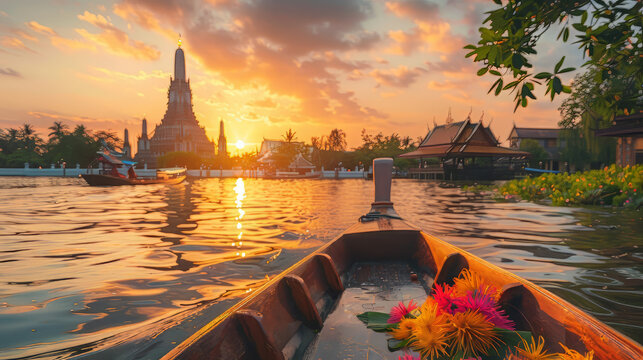
Thailand is the heart of Southeast Asia, a land of lush landscapes, dreamy beaches, vibrant cities, and an ancient culture that has captivated travelers from all over the world. From bustling Bangkok to the paradise islands and temples of Chiang Mai, Thailand offers a unique diversity that makes it a must-see destination. At Asia Charm DMC, we specialize in creating luxury, personalized itineraries designed according to the interests of our clients.
Airports
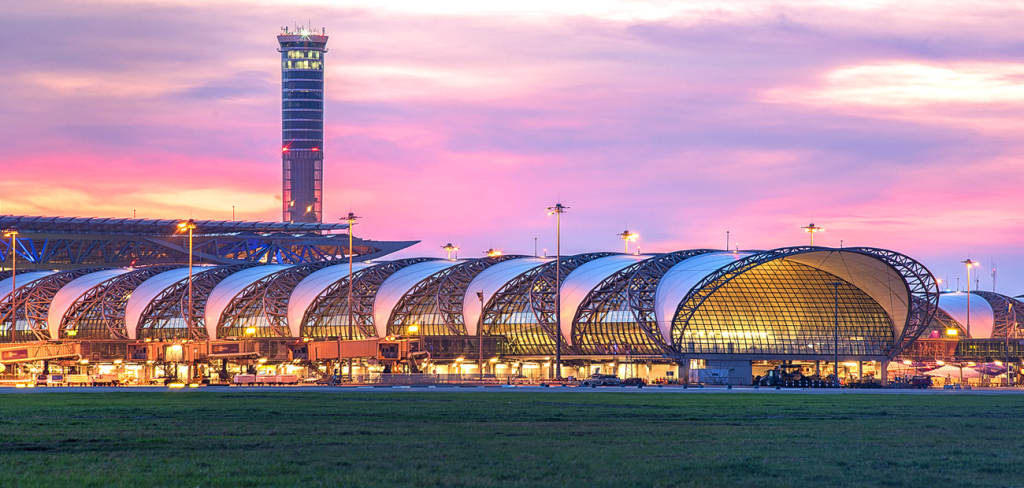
Thailand has several international airports that serve as gateways for travelers. The most notable ones include:
- Suvarnabhumi Airport (BKK): Located in Bangkok, this is the main international airport and one of the busiest in Southeast Asia. It serves as a hub for numerous international airlines.
- Don Mueang International Airport (DMK): Also in Bangkok, this airport primarily handles low-cost carriers and domestic flights but also offers some international services.
- Phuket International Airport (HKT): The main airport serving the popular tourist destination of Phuket, it handles a significant number of international flights, especially during the tourist season.
- Chiang Mai International Airport (CNX): The primary airport for northern Thailand, it offers both domestic and international flights, connecting to several major cities.
- Krabi International Airport (KBV): This airport serves the Krabi region, including popular destinations like Ao Nang and the Phi Phi Islands, with international flights mainly from neighboring countries.
- Hat Yai International Airport (HDY): Located in southern Thailand, it serves both domestic and international flights, catering mainly to Malaysia and Singapore.
- Samui International Airport (USM): An airport on Koh Samui island, it connects to several international destinations, primarily in Asia.
These airports facilitate travel to and from Thailand, supporting the country’s robust tourism industry.
Visa
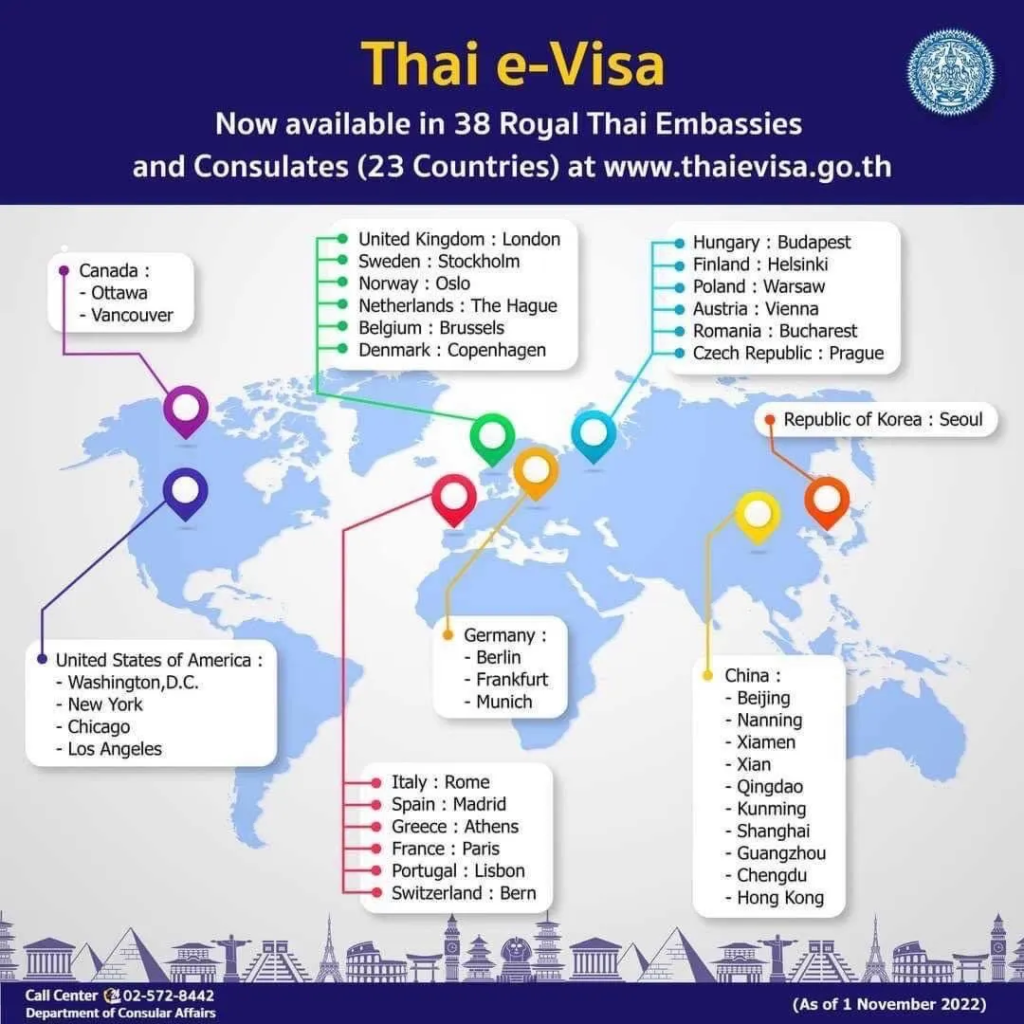
Citizens from several countries can enter Thailand without a visa for short stays, typically up to 30 days for air travel and 15 days for land borders. Examples include the United States, Canada, the UK, Australia, and many EU countries.
Citizens from certain countries can obtain a visa on arrival for stays of up to 15 days. This usually applies to countries that do not have a visa exemption agreement with Thailand.
If you’re planning to stay longer than the visa-exempt period (usually over 30 days), you’ll need to apply for a tourist visa before traveling. This allows for stays of up to 60 days and can sometimes be extended
Bank & ATM
In Thailand, bank working hours typically from 8:30 AM to 3:30 PMor 4:00 PM (Monday to Friday). On Saturdays, many banks open from 9:00 AM to 1:00 PM. On Sundays and Public Holidays most banks are closed.
It’s always a good idea to check the specific hours of the bank branch you plan to visit, as they can vary, especially in tourist areas or larger cities. Some banks also have ATMs that are available 24/7 for cash withdrawals.
ATMs in Thailand are widely available and offer a convenient way to withdraw cash. ATMs can be found in urban areas, tourist destinations, shopping centers, airports, and convenience stores. The typical withdrawal limit is around 20,000 to 30,000 Thai Baht per transaction, but this can vary by bank and ATM. International cards may be subject to additional fees, both from your home bank and the ATM operator. Fees can range from 150 to 300 Baht per transaction.
Using ATMs is a convenient way to access funds while traveling in Thailand, but it’s always good to have some cash on hand for smaller purchases or in case of emergencies.
Currency

The currency in Thailand is the ThaiBaht with coins (1, 2, 5, and 10 Baht, as well as 25 and 50 satang coins) and banknotes (20, 50, 100, 500, and 1,000 Baht) Each denomination has a distinct color and design. Exchange rates can fluctuate, so it’s a good idea to check the current rate before converting money. You can exchange currency at banks, exchange booths, or ATMs.
While cash is widely accepted, credit and debit cards are also commonly used in hotels, restaurants, and shops, particularly in urban areas.
When traveling in Thailand, it’s advisable to carry some cash for small purchases, especially in markets or rural areas where card payments may not be accepted.
Custom Allowances
When traveling to Thailand, travelers are allowed to bring personal items without duty if they are for personal use, such as clothing, toiletries, electronics (like cameras and laptops), as long as they are not for commercial purposes. You can bring up to 20,000 Baht in cash without declaring it. For items such as gifts and souvenirs, there are additional allowances, but the total value should not exceed 20,000 Baht to avoid customs duties.
Electricity
In Thailand, the electrical system operates with the standard voltage is 220 volts and the frequency is 50 Hz. Thailand primarily uses Type A and Type C plugs. Type A has two flat parallel pins, while Type C has two round pins.
If your devices use a different plug type, you’ll need a plug adapter. If your devices are not compatible with 220 volts, you may also need a voltage converter to avoid damaging your equipment.
Food

Thai cuisine is renowned for its bold flavors, aromatic herbs, and diverse ingredients. Here are some popular dishes and food experiences to try while in Thailand:
Pad Thai: Stir-fried rice noodles with shrimp, tofu, or chicken, tossed with eggs, bean sprouts, and peanuts, often served with lime.
Tom Yum Goong: A spicy and sour soup made with shrimp, lemongrass, kaffir lime leaves, galangal, and chili, known for its refreshing flavor.
Green Curry (Gaeng Keow Wan): A spicy coconut milk-based curry made with green curry paste, meat (like chicken or beef), and vegetables, served with rice.
Massaman Curry: A milder, rich curry influenced by Indian flavors, often made with beef, potatoes, and peanuts.
Som Tum (Papaya Salad): A spicy salad made from shredded green papaya, tomatoes, peanuts, and a tangy dressing of lime, fish sauce, and chilies.
Mango Sticky Rice (Khao Niew Mamuang): A popular dessert made with glutinous rice, fresh mango slices, and coconut milk.
Satay: Grilled skewers of marinated meat (often chicken or pork) served with peanut sauce and cucumber salad.
Khao Soi: A Northern Thai coconut curry noodle soup, typically made with egg noodles and served with pickled mustard greens and lime.
Thailand is famous for its street food culture. Explore local markets for dishes like fried bananas, spring rolls, and grilled meats. Night markets are popular for trying a variety of foods in one place, from skewers to desserts.
Exploring Thai food is a delightful experience, with flavors and dishes that vary widely across the country. Enjoy your culinary adventure!
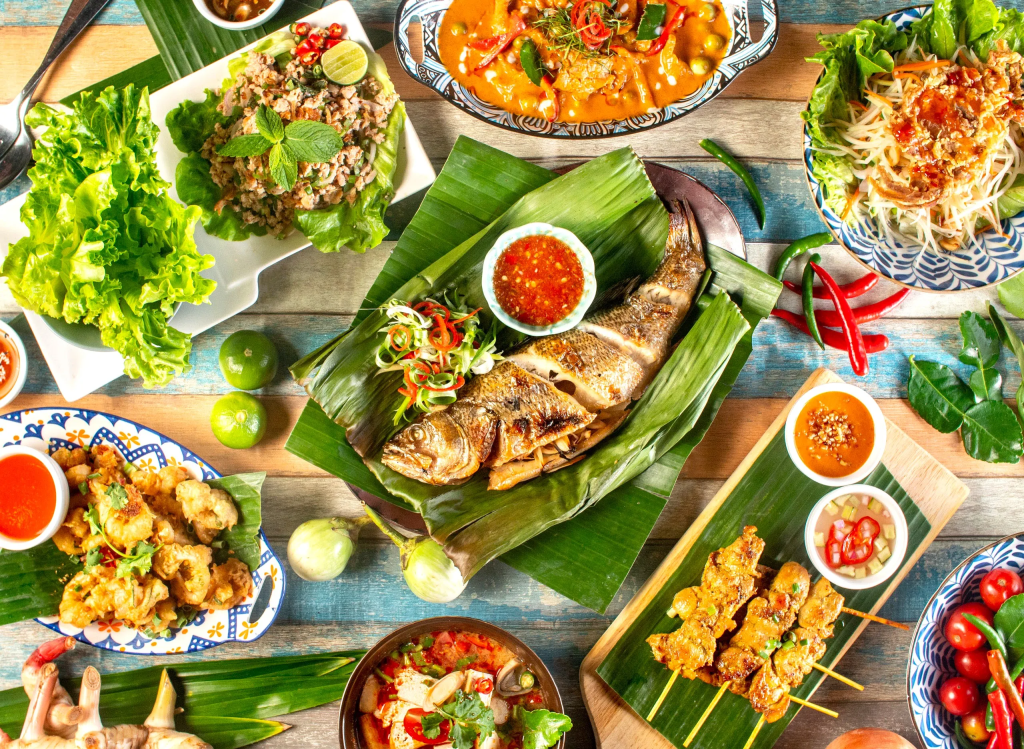
Health & insurance
Before traveling to Thailand, it’s best to consult with a healthcare provider or travel clinic at least 4 to 6 weeks before your trip to ensure you have the necessary vaccinations and health precautions in place.
Hotel options

Thailand offers a wide range of hotel options to suit various budgets and preferences from luxury hotel & resort brands to mid-range hotels, budget hotels and hostels, guesthouses and B&Bs
Thailand also offers unique stay options with treehouse villas in Koh Yao Noi and luxury tented camp in Khao Sok National Park, offering a blend of adventure and comfort.
Whether you’re looking for luxury, budget-friendly options, or unique experiences, Thailand has something to suit every traveler.
Internet
Internet access in Thailand is generally good, especially in urban areas and popular tourist destinations. Most accommodations offer free Wi-Fi, either in rooms or public areas. Many restaurants and cafés provide free Wi-Fi to customers, especially in tourist areas. Larger malls often have free Wi-Fi available throughout the premises.
You can purchase a local SIM card from major providers (e.g., AIS, TrueMove, DTAC) at the airport or convenience stores. They offer prepaid data plans suitable for tourists.
Staying connected in Thailand is relatively easy, allowing you to navigate, share experiences, and stay in touch while traveling.
Public holidays
Thailand has several public holidays throughout the year, both national and religious. Here’s a list of major public holidays:
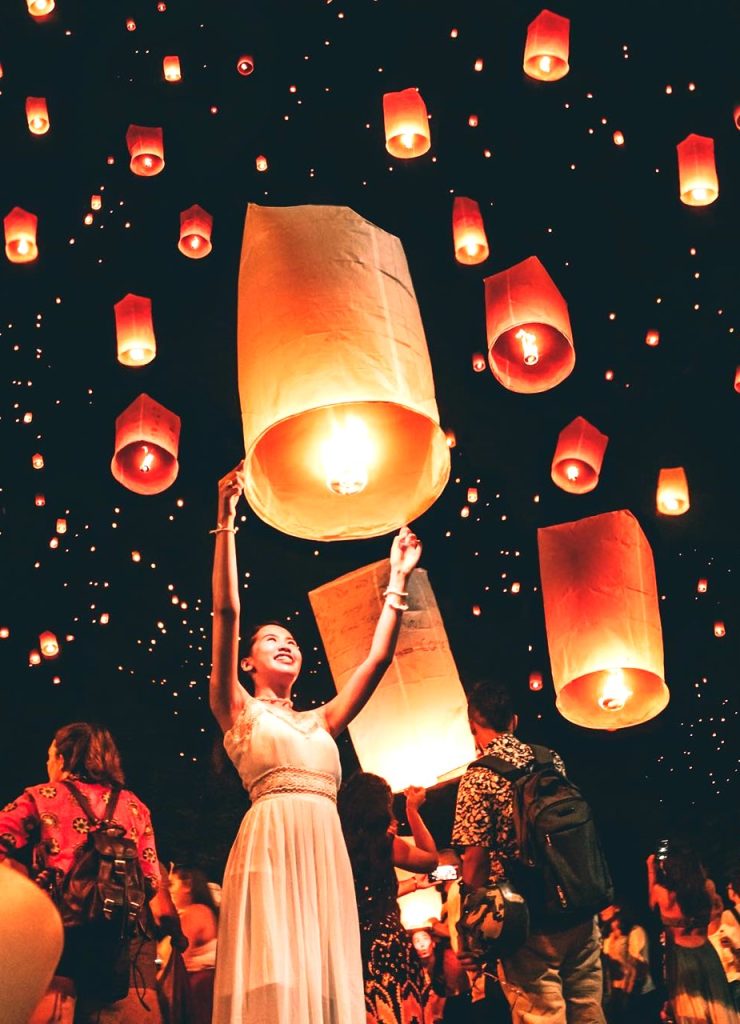
New Year’s Day: January 1
Makha Bucha Day: Celebrated on the full moon day of the third lunar month (usually in February or March).
Chakri Memorial Day: April 6
Songkran (Thai New Year): April 13-15 (often extended to a longer holiday).
Labor Day: May 1
Visakha Bucha Day: Celebrated on the full moon day of the sixth lunar month (usually in May).
Asahna Bucha Day: Celebrated on the full moon day of the eighth lunar month (usually in July).
Buddhist Lent (Khao Phansa): Starts the day after Asahna Bucha Day and lasts for three months.
King Bhumibol Memorial Day: October 13
Chulalongkorn Day: October 23
King’s Birthday: December 5
Constitution Day: December 10
New Year’s Eve: December 31
Notable Religious Holidays
Loy Krathong: A festival celebrated on the full moon night of the 12th lunar month (usually in November).
King Maha Vajiralongkorn’s Birthday: July 28 (new national holiday).
Many holidays involve festivals, religious ceremonies, and family gatherings. Some holidays may lead to businesses and government offices closing, so it’s advisable to check in advance if you plan to travel during these times.
Religion
Thailand is known for its rich cultural and religious heritage, with the following key aspects of religion in the country:
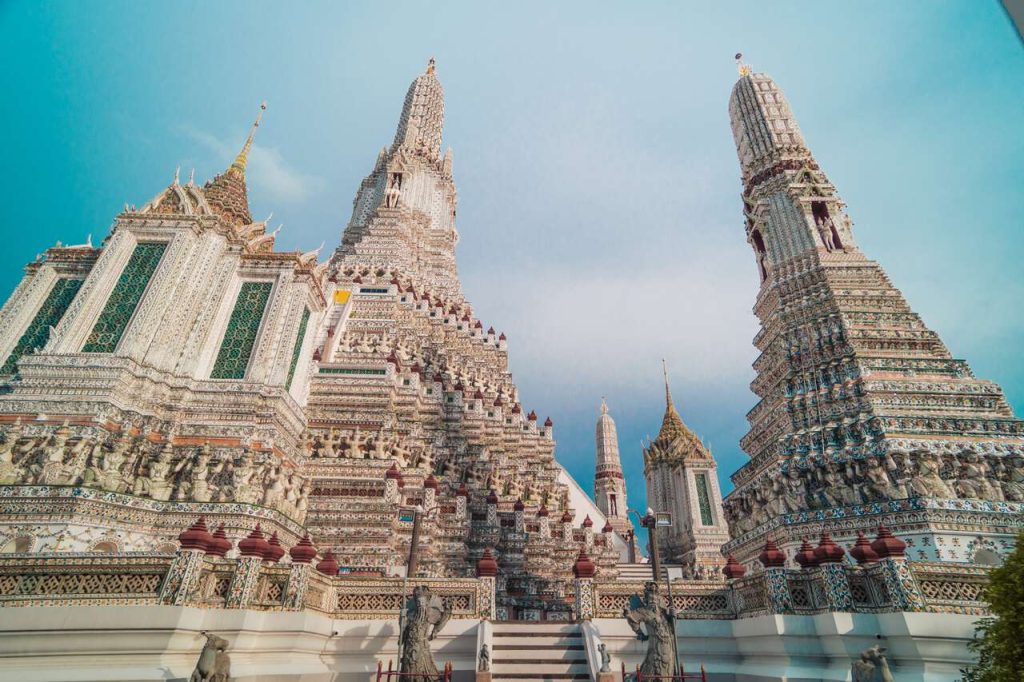
Buddhism is major religion with approximately 95% of the Thai population practices Theravada Buddhism, which is the official religion of the country. Thailand is home to thousands of temples (wats), each serving as a center for community life and religious activities. Many Thai men spend some time as monks, a tradition that is highly respected.
Other Religions are Islam, Christianity, Hinduism
The Thai royal family plays a significant role in the promotion of Buddhism and is deeply respected by the people. The King is seen as a protector of the religion.
Religion in Thailand shapes the daily lives of its people, influencing traditions, festivals, and community interactions, making it an integral part of Thai culture.
Timezone
Thailand is in the Indochina Time Zone (ICT), which is UTC +7. Thailand does not observe daylight saving time, so the time difference remains constant throughout the year.
Tipping
Tipping in Thailand is generally appreciated but not mandatory. Here are some guidelines to help you navigate tipping in different situations:
At Sit-Down Restaurants: It’s common to leave a tip of around 10% of the bill if service is not included. If service is included, rounding up the bill or leaving small change is appreciated.
For Street Food and Casual Dining: Tipping is not expected, but you can leave small change if you enjoyed the meal.
For guided tours: A tip of around 100-200 Baht per person for a full-day tour is common. If you have a driver for a day, consider tipping around 100 Baht.
It’s often best to tip in cash, as some establishments may not include tips in credit card transactions.
Water
It’s generally not recommended to drink tap water in Thailand. Bottled water is widely available and inexpensive, making it a safer option for drinking.
Weather
The weather in Thailand varies by region, but in general, the best time to travel is from November to February, when temperatures are cooler and rainfall is scarce. This period is ideal for enjoying the southern beaches and exploring the northern cities, such as Chiang Mai and Chiang Rai.
High season: From November to February, the days are sunny, with pleasant temperatures hovering around 25 to 30 degrees Celsius. It is the perfect season to visit temples, enjoy the beaches and do outdoor activities.
Rainy season: From May to October, especially in the northern and central regions, the monsoon brings frequent rainfall, although beaches in the Gulf of Thailand, such as Koh Samui, tend to have better weather during these months.
Summer: Between March and May, temperatures are higher, reaching 40 degrees in some areas, which can be uncomfortable for some travelers. However, it is a good time to enjoy the tranquility in less crowded destinations.
Emergency contact numbers
In Thailand, the following emergency contact numbers are important to know:
- Police: 191
- Ambulance and Medical Emergencies: 1669
- Fire Department: 199
- Tourist Police: 1155
